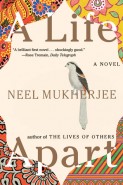
Book Review: A Life Apart by Neel Mukherjee

A Life Apart
A Novel by Neel Mukherjee
W.W. Norton & Company, March 2016
ISBN-13: 9780393352108
$16.95; 384 pp.
Reviewed by Phillip Garland
Neel Mukherjee’s A Life Apart presents the journey of Ritwik Ghosh, from his embittered childhood in Calcutta to his new life among the marginalized of England. Ritwik’s status as outsider is repeatedly affirmed throughout the novel. After separating himself from his past life in India, blotted with a history of child abuse, Ritwik’s student days in Oxford further his alienation and prevent his integration into British society. Mukherjee’s central accomplishment in this novel is how he injects personal agency into the narrative of multiculturalism. A Life Apart is a complex and thrilling bildungsroman that grapples with how to retain (and shape) one’s identity while living on the fringe of society.
Ritwik’s journey is punctuated by the tale of Miss Gilby, a story that Ritwik is writing. Despite the novel switching between these stories with each new chapter, there is not much in Miss Gilby’s story that informs or gives some new perspective to our understanding Ritwik. It is true that, like Ritwik, Miss Gilby is an outsider in her narrative. But the similarities end there and, later on, these excerpts primarily serve as mere foreshadowing of A Life Apart’s events.
The most successful portions of the book are Ritwik’s own, and it is in the second half of the novel where where his exposure to danger and violence reveals, with a startling clarity, Ritwik’s soul. Living among an enclave of illegal immigrants in London, Ritwik encounters a diverse cast of threatening characters, their work and motives unclear, as he attempts to balance taking care of an elderly shut-in while moonlighting as a prostitute in London’s seedier corners. The novel is full in its heart with sympathy for Ritwik’s plight. He must hide away the most essential aspects of his identity, and this balancing act coalesces into an absolutely crushing finale.
Mukherjee’s language dazzles throughout. He describes the “wet jewels in the hair” that appear to those wandering in the nuanced mist of English rain. After one of Ritwik’s mother’s violent outbursts, he imagines how “the theatre inside her head broke into a tumultuous applause.” He roams the tired grit of the streets with “underdressed children, really, all gangly arms and bones and the shadow of night under their eyes.” This novel is rich in metaphoric language, giving insight into Ritwik’s character as a solitary aesthete, a lover of books.
Ritwik is regularly the object of cultural assumption. In one cringe-inducing scene, not lacking in humor, an older gentleman Ritwik has just serviced says to him, “You’re Hassan, my prince, my lovely prince Hassan.” While conversing with Ritwik, an Oxford student says of India, “It’s so exotic, isn’t it? And wild, do you know what I mean?” Mukherjee moves on from these touchstones of cultural confusion and comes up against something much more difficult: “He feels a sudden rush of irritation for this business of other cultures, other countries, renaming and recategorizing things, using their own yardsticks, for other people as if their definitions were universal. But this fades away as swiftly as it has arrived with the question, ‘What if they’re right?’” How then is Ritwik able to have a say in who he is? He cannot look back to India. Regarding the past, “he won’t even think about it because if he lets go for even a few seconds, the grey, sour rain outside will bend him to its own form.” Instead, Ritwik risks a transformative leap, hoping to “have a new body in England, even be a new person.” It is in the final pages of A Life Apart where we learn the true cost of this decision. Mukherjee pulls no punches here, showing that even at the risk of death, in the end, it is Ritwik who chooses.
Phillip Garland’s fiction has appeared in Parcel, Vol. 1 Brooklyn, redlightbulbs, and other places. He hails from Tennessee and lives in Chicago.

Leave a Reply